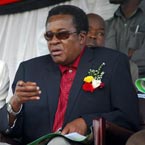
By our staff A Harare man has launched a legal challenge against a provision requiring households and individuals to have valid listeners and viewership licences. The landmark challenge by Bernard Wekare at the magistrates court, comes after the executive was served with a notice to appear before the Magistrates Court for failing to produce a listeners’ licence in contravention of the Broadcasting Services Act.
The Act penalises the possession of a radio or television set without a valid licence.
The Attorney-General’s office is cited as the first respondent, while the Zimbabwe Broadcasting Corporation (ZBC) is the second respondent.
Wekare, in his application, argued that the possession or ownership of a television set did not necessarily mean it was intended for purposes of accessing ZBC’s broadcast material.
He also cited technological technicalities commensurate with the advent of broadcast services, which can also be accessed through cellphones, ipads, and computers, among other gadgets.
“By requiring all television set owners to pay licences to second respondent, (ZBC), the law is in fact compelling me to associate with the second respondent and its programmes, which may have personnel I do not wish to associate with or content I do not subscribe to and therefore do not wish to have beamed into my home,” reads the application.
Wekare further argued that the forced payment of licence fees in respect of a service not required, constituted a breach of section 16 of the country’s Constitution, which provides that no property . . . shall be compulsorily acquired.
“I contend that the compulsory payment of licence fees to the 2nd respondent under a penalty of a criminal prosecution, constitutes a compulsory acquisition of the licensee’s property in the form of money and it cannot be deemed to be reasonably justifiable in a democratic society,” reads the application.
- Chamisa under fire over US$120K donation
- Mavhunga puts DeMbare into Chibuku quarterfinals
- Pension funds bet on Cabora Bassa oilfields
- Councils defy govt fire tender directive
Keep Reading
Wekare also argued for the right to the protection of the law, of freedom of conscience and protection of freedom of expression.











